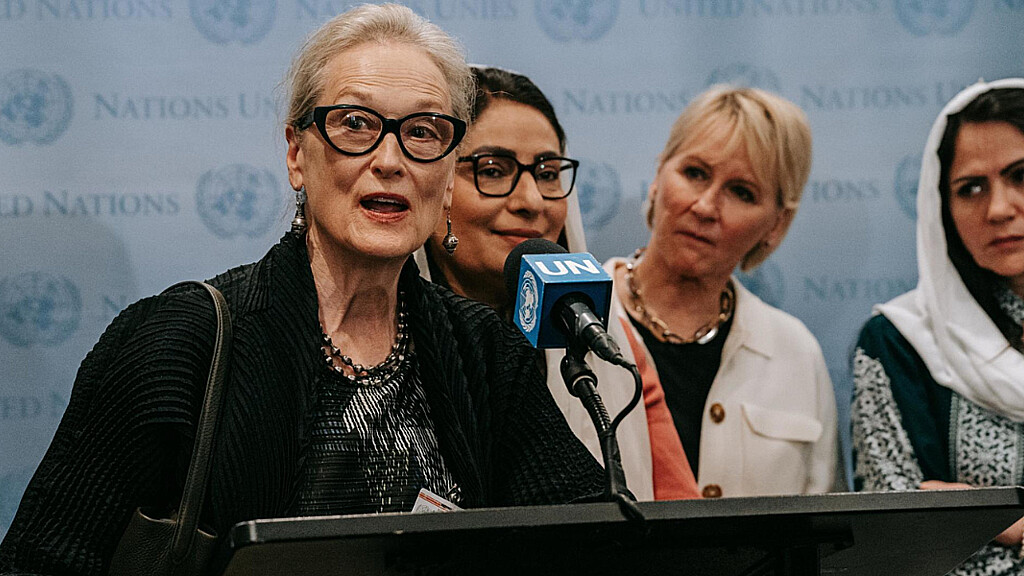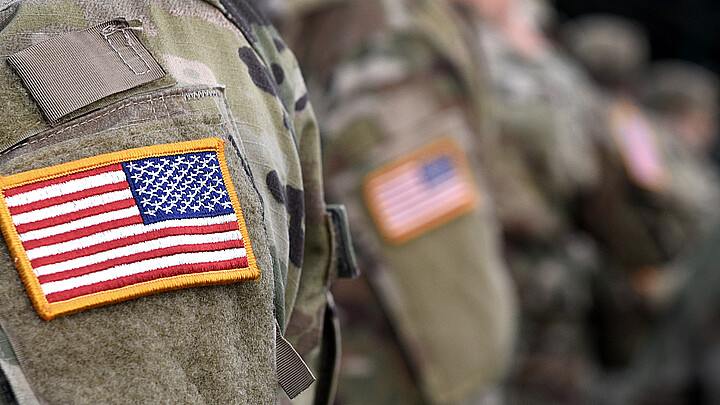Human Rights
Meryl Streep at the United Nations: "A squirrel has more rights than a girl in Afghanistan"
During a debate forum, it was also noted that at least 1.4 million girls were banned from secondary education in 2024 in the Middle Eastern country

September 24, 2024 2:30pm
Updated: September 25, 2024 9:25am
Afghan women put their lives at risk this week by raising their voices and asserting their rights at the United Nations. The brave Afghan women spoke out during a parallel event of the U.N. General Assembly that has been in session since Monday in New York, where critically acclaimed actress Meryl Streep lamented that, in the Middle Eastern nation, even “a squirrel enjoys more rights than a woman.”
Afghanistan’s Taliban regime passed a law in August for the Propagation of Virtue and Prevention of Vice that requires women to cover their faces and condemned the sound of a woman’s voice in public as an offense against modesty, culminating in the most rigorous interpretation of Islamic law to date.
The United Nations has described the Taliban’s new law as “gender apartheid.”
“The new law enacted last month formalizes the systematic removal of women and girls from public life. Afghan women and girls are largely confined to their homes, with no freedom of movement and almost no access to education or They are even prohibited from singing or raising their voices in public,” noted U.N. Secretary General António Guterres at the beginning of the event, which was organized by Ireland, Qatar, Switzerland, Indonesia and the Women’s Forum on Afghanistan.
The protagonist of “The Devil Wears Prada” took the floor in a debate titled “The Inclusion of Women in the Future of Afghanistan,” and asserted in her speech that, “Today in Kabul, a female cat has more freedoms than a woman,” the Academy Award-winning actress said.
“A cat may go sit on the front porch and feel the sun on her face; she may chase a squirrel in the park. A squirrel has more rights than a girl in Afghanistan because the public parks are closed to women and girls by the Taliban,”
She then added if the world came together to help the people of Afghanistan, they could make a difference.
#24Sep | La actriz Meryl Streep habló en la ONU sobre la crisis humanitaria que viven las mujeres en Afganistán, silenciadas en su propio país debido a las restricciones impuestas por el régimen talibán.
— 2001online (@2001OnLine) September 24, 2024
“Hoy, en Kabul, una gata tiene más libertades que una mujer. Una gata puede… pic.twitter.com/zLd9f4YX47
“I feel that the international community as a whole, if they came together, could affect change in Afghanistan, and stop the slow suffocation of an entire half (of) the population,” she expressed.
Streep also explained in her speech that in that Afghanistan was not always been so restrictive for women, explaining that women in Afghanistan received the right to vote in 1919 while women in Switzerland did not have that same right until 1971.
“In the 70s, most of the civil servants were women. Over half the teachers were doctors, there were women jurists and lawyers in every profession,” she explained. “In 1971 I graduated from college here in New York, and that year, women in Switzerland obtained the right to vote. Women in Afghanistan, of course, had enjoyed that right for half a century.”
Indonesian Foreign Minister and U.S. Special Envoy on Water Retno Marsudi described herself as: “a woman, a mother, a grandmother and a Muslim,” noting that she should have access to all rights, including the right to speak in the United Nations building.
“When I am here, I can express what I think. I can express my aspirations. Afghan women should enjoy the same right, but the situation is completely different. Now they face a setback in progress in education, employment and social freedom,” Marsudi said.
The foreign minister and envoy also noted that by 2024, at least 1.4 million girls were banned from secondary education, an increase of 300,000 since its previous count in 2023.
This worrying situation demands the free world’s utmost attention, according to UNESCO.
This Sept. 24, the Women's Forum of Afghanistan presented the documentary, “The Sharp Edge of Peace” about Afghan women leaders, who took the microphone to talk about the worrying situation in their country.
Thos women included former Afghan Minister of Women's Affairs and Minister of Culture and Education Habiba Sarabi, former Vice President of the Parliament Fawzia Koofi, and Asila Wardak, the former Director General of Human Rights and International Women's Affairs at the Ministry of Foreign Affairs of Afghanistan.









